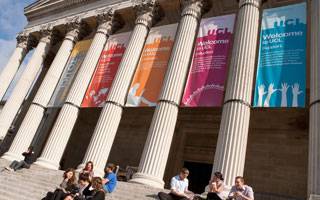Written by Amy Buxton
Photography Amanda Low
5th October 2016
A new year, and yet another inevitable rejig of the faces of Anth Soc. Some of us have graduated, never to been seen again (although most could not be torn away from the department and are here doing postgraduate stuff or just generally hanging around), some of us have come back from our year abroads, and we also welcome some new faces. So begins the inter-year mingling!
We kicked off with our first event, asking What is Digital Anthropology? We decided that as Digital Anth is not a subdiscipline of the department, like social, biological, material, and medical, and the first year students don't get introduced to it, that Digital Anth would be the perfect topic for our first discussion.
We welcomed Danny Miller, Shireen Walton, Jesse Bia, and Juliano Spyer of UCL's Anthropology Department into our student common room to talk about Digital Anthropology. Each of them have their own unique experiences with digital technologies. We were very pleased to see so many people, particularly first year students and master's students show up for the talk (and we apologise for those who did not get a chair, thank you for standing so patiently throughout!)
In answer to our main question, Well then, what even is Digital Anthropology? Danny Miller, the founder of the sub genre, gave his answer:
Miller is currently heading an enormous project Why We Post, which combines research communities all over he world to determine the different and the changing ways in which people use social media.
He begins by saying that, of course, for all of us in the room, the digital world is just a mundane part of everyday life and is usually involved in most of our relationships in some way or another. So in a sense, all anthropology that takes place today must account for the digital. He asked, is it valid to say that because we are now all online we are now all more similar and somehow a bit less human? Absolutely not. Miller said that the important thing to remember is this: just as people everywhere do life differently, so too do we do digital life differently, often in ways that are specific to one community. Anthropologists are asking the same fundamental questions, but research must keep up with the pace of change in the world too in order for our work to be valuable and relevant. Digital Anthropology has emerged because the digital world is playing an ever greater part in our everyday lives.
So digital anthropology emerged from UCL. Where did it come from? It actually emerged from the material culture subdiscipline. But The Digital is all virtual, you wonder!? The experts at UCL would beg to differ. It is distinctly material. The online space is as much a material space as the one you're sitting in now. Things happen there, so it is a space bubbling with potential research material. Miller continued by adding that this department tries to look at the contemporary in different way to other anth departments. Anthropology to us means that it is possible to study everything, everywhere. Whether that is a village in England or factory workers in China. Anthropology is about changing with people. We are comfortable with change. We enjoy change. We are not history, he says!
What is it like to be an anthropologist?
Juliano has been in the department since 2010. He did his master's in digital anthropology, following on from his 15 year career in building social media platforms. So used to focusing on the technologies themselves for so long, he thoroughly enjoyed the anthropology of technologies, of breaking down the jargon and looking at the bigger picture. So much that he move onto a PhD in digital anthropology. Juliano enjoyed this department's grasp of the contemporary. He was able to marry his internet experience with the social sciences and has been working on two very different areas of research since coming to UCL. He worked with working class people aspiring to middle class in the North Eastern coast of Brazil, and he also studied YouTube beauty gurus. To do the latter he had to learn to become a makeup guru himself! Juliano interacted with his informants through their chosen medium, the medium of YouTube, as well as taking a makeup course, in order to understand what was really going on and why people do this.
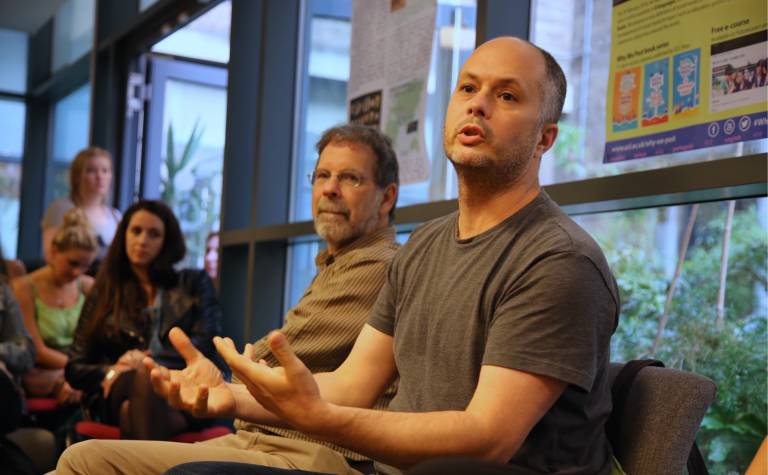
For his research in Brazil, it was essential for him to be present within the community of around 15,000 people. To understand what they did online, Juliano had to hear the gossip offline too. He discovered that various social media were being used to filter this noise. For young people, the more literate generation, they could use Facebook to talk amongst themselves without being watched by the older generations, who had lower literacy levels. So, the way in which you choose to enter the field and interact with the informants must suit the community and the research question at hand.
Shireen Walton spoke about her research on photo blogging in Iran. As Miller mentioned earlier, anthropologists are interested in change. In 2012, Shireen was hearing sensationalised stories of Iran in the news constantly. She wanted to discover what was happening outside of big political stories and movements. What were the young people doing on a daily basis? They were photo blogging. Again, anthropology allowed Shireen to look at the everyday things. Her interest in visual anthropology and photography led her to the photo bloggers online. Like most anthropologists, she came across difficulties when trying to stay in Iran and conduct interviews in a politically volatile environment. Her time was up and she had to return to the UK. Shireen told us that the online platform, for her, was a way to keep conducting her research despite these setbacks. Although she would have liked to stay in Iran, she was able to maintain the relationships and connections she made when she was out there. Immersing herself in the field both in Iran and back home, Shireen was able to make connections between the political events happening in Iran at the time, the types of restrictions that existed in terms of imagery that was allowed to be shown in the street, and the photos being shared in a collaborative space online. Why were certain images chosen and being shared? Again, Shireen's immersion was essential in understanding all that was happening there.
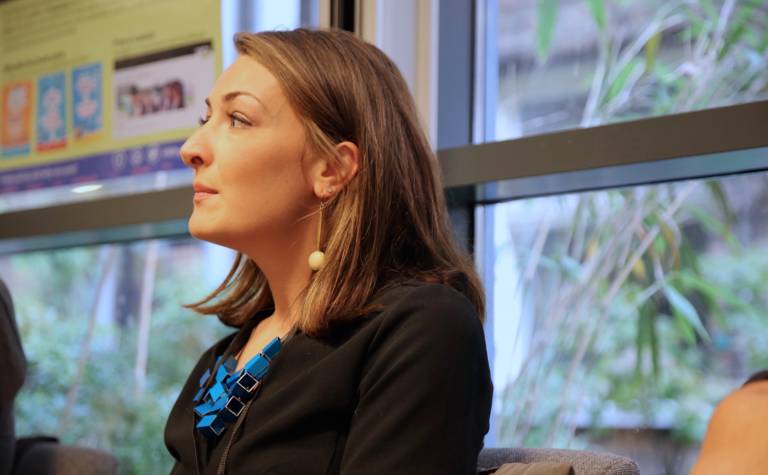
Jessie Bia introduced himself next. As an undergraduate, he majored in anthropology and Japanese in the states and then did his master's at Oxford. He came to UCL to combine his many interests and become part of medical anthropology here, though his work is highly interdisciplinary. Oh, and he and just, no literally just, got back from two years in the field in Tokyo.
Jessie's research deals with the social impacts of regenerative and stem cell medicine, though he stressed the importance of understanding how the technology itself works too. Jessie was asking: Who makes this medicine available, who has access to it, and how do people react to, engage with, and perceive this new technology? He conducted his research in hospitals and laboratories, he spoke with families, politicians, other researchers and also people in jobs not related to this medicine in Tokyo, so he had many diverse access points to help him answer these questions.
How does Jessie's work overlap with principles of digital anthropology? Well, as we said, Jessie's research is highly interdisciplinary. He must understand his informants' conceptions of The Body. Is it different to his own conceptions? He then asked how people are interacting (or not) with the new technologies. This often means applying the same methods and techniques as those who describe themselves as digital anthropologists. Jessie reiterated the idea that immersion is key. You have to "get under the discourse", he says. Just because technology exists, that doesn't necessarily mean that people are using it, and you have to go fully into the field to find this out.
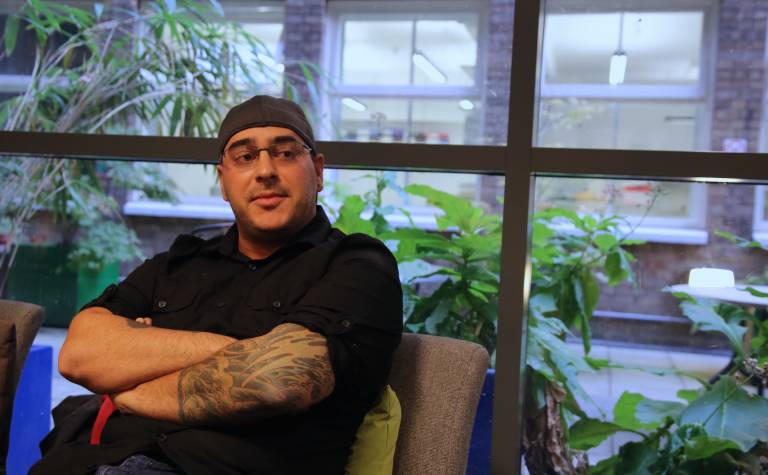
But the four people at the front were not the only keen anthropologists. After listening to what it's like to have to incorporate digital anthropology into your everyday work and life, our audience were eager to ask questions.
The panel stressed the importance of immersing yourself in what you study, in getting involved in the practise. But, what were their thoughts on autoethnography? In looking at yourself, the researcher, as source of primary data?
Miller said he was against it, although admitted that we cannot get away from autoethnography as anthropologists. We always affect our findings and we should be aware of that, admit to it and find out how we affect the research we do and the conclusions we make about the field. He added that our work as anthropologists challenges us and makes us introspective. But it should be in that order. Don't introspect first. Do the research, then let that help you to reflect on yourself. Trying to understand somebody who is completely different from you gives you the chance to grow as a person and introspect. It leads you to ask, why do you believe what you believe? Get out of yourself, engage in and care about other people, then you will grow yourself. That is the cycle. Come back to yourself at the end, Miller concludes.
How would you advise us to make most of our time as first, second, third year undergraduates?
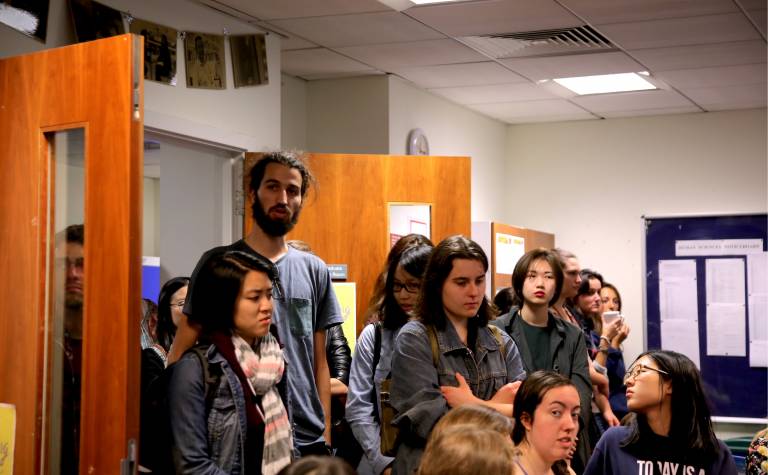
"Seminars!" says Juliano. There are lots of them that you can go to and some of them can be brilliant! Either way, you gain an insight into a researcher's middle stage, the one between research and publication. This department honours their faculty and gives time to everyone, listens to everyone's research. You don't receive a grade for going to seminars but it's a great way to see research in the making.
Jessie advised us to introduce ourselves to professors, PhD students, and fellow students who are interesting to you. They may then keep you in mind for projects and events they are working on.
Then came a question for Danny Miller: You are doing crosscultural research in Why We Post, how do you deal with peoples' anxieties about The Digital penetrating into all aspects of our lives?
Miller replied by agreeing that lots of people tell you they are anxious about The Digital, and mourn the loss of a supposedly more authentic time, a time when we were more human before. This is part of the general nostalgia around us. Moreover, the media discovered that it's much more easy to sell a newspaper if you to make your audience anxious. As an anthropologist, Miller considers digital technologies as neither good nor bad. The two outcomes will always exist simultaneously. Anthropologists must put things in perspective of all that is going on, which comes back to the idea of immersing ourselves completely in the research at hand. That is the difference between us and journalists. Our job is not to sensationalise but to deal with the complex range of things happening. People often say we are losing our humanity, so does that mean that young people, the digital natives, are less human than older people? Of course not, everybody is equally human! The Digital has not produced post-humans, trans-humans, or cyborgs! And we are certainly not more technologically dependant than before. It is just that the types of technology we are using have changed. Rice farmers' livelihoods are totally dependent on technology, for example. Farming tools and weather tools and so on. Anthropologists should find out the good and bad things that have happened as a result of changes in technology.
Is it possible to do ethnography solely in and on the Internet and is that 'good' fieldwork'?
Juliano says that it depends what kind of research you do. For him, studying YouTube vloggers, many of whom were minors, there were ethical limitations in terms of visiting the vloggers at their homes or gaining permission to interview them. So he interacted with them online. Juliano studied vloggers who were in contact with each other so there was a linked community of beauty video bloggers who had a range of mutually understood rankings that relied on the quality of their videos and the number of YouTube followers they had. Juliano had to become part of this world. Tom Boellstorff, who wrote Coming of Age in Second Life, for example, strongly advocates doing research on your informant's terms. In Brazil, Juliano's research was different. There, people used social media to meet and speak to the people they lived with, and social media was often a private space. For that reason, Juliano had to be there in person too.
Shireen said that being a woman in Iran adds another difficult element to the politics of access. It would be impossible to hang out for hours in people's rooms, interviewing them or living their daily lives. However, virtually on Skype this is more possible. For Shireen, her research could not have continued without carrying out her research online. As well as the politics of access, you also become aware of the politics of gender, mobility, finance, and travel. Online research is not a replacement for face to face fieldwork, but in some cases, the internet can be an essential tool for access.
How do you deal with rapid change as researchers? And cope with a research question that changes from beginning to end?
Drawing on what was said earlier, Miller tells us that the job of anthropologist is to understand a rapidly changing world. So it's good if what you're studying is rapidly changing. We study change. We observe change and write about it.
Shireen describes how the field of technology is, of course, rapidly changing. Photo blogging today is different to in the early 2000's and in the 1990's, the visual materials studied were totally different to those studied today. So material and social change is part of the enquiry.
Jessie studies people who are leading the change in medical technology. He reiterates that you must keep constantly up to date with the actual technologies that you are writing about. Not as an expert, but you must understand the mechanisms of how a particular technology really works.
Juliano talks about the anxiety of change that seems to be all around us. Technology is seen as something that is imposing itself on us. Often, people forget to look at the continuities. Blackberry messenger, for example, is a precursor to WhatsApp. His advice was to be cautious when thinking about how fast things are moving and ignoring the continuities. We have always been reliant on all sorts of technologies, how do the new ones link to previous versions?
And we had one final question. How do you feel about passive observation? What are the ethical implications to observing subjects who don't know you are observing them?
Miller replied saying that we are all very much active anthropologists. We act and participate in what people do in their everyday lives. Miller used to study clothes shopping. He gave the example that whilst engaging in that activity, he would not passively observe but forge a natural relationship with the people he was studying by getting involved. He would give opinions on what looked good and so on! It is not natural to be a passive bystander in most situations.
Juliano says that when he first arrived in the field in a Brazil, people thought he was a police officer! They wondered where his money came from and why he was pacing around watching them and asking questions! Being somebody who was doing a doctorate was quite incomprehensible to them and so it made a huge difference to sit down and explain what he was doing there. After that they became more interested, asking him things and wanting to show him things. So a two way relationship developed whereby they were learning through Juliano as much as he was learning through them. This also leads back to the idea that you cannot remove the anthropologist from the work we produce. The presence of the researcher always has some sort of impact that cannot be ignored.
Shireen points out the common discrepancy between what people say and what they do. When you have been working with people for many months and you think you know them, they go and do something quite surprising. This change is obviously a normal part of life. The ethics of research, of observing, interviewing and writing about people, particularly for online research, can get very tricky. Christine Hinds* wrote about a rather creepy sounding notion of lurking. In this case, you're passive, you're not with your informants. For example, if they are blogging or posting online, you are observing all of this from elsewhere. However, this is not a passive activity because as an anthropologist you're looking at things and experiencing things. What you are seeing is affecting you and in turn you affect what you are seeing. Your future actions and thoughts will be altered by this experience. As well as this, you may even comment and interact online too.
Jessie concluded the Q&A by saying that an important part of research, which also pertains to this idea of difficult ethical boundaries is spending time with field subjects off the clock. In Japan it is quite compulsory to drink with your work colleges. We call it nomunication (which comes from the Japanese word nomu meaning to drink and communication). Socialising off the clock builds trust with informants, which is essential when conducting good and meaningful research.
We thanked our speakers for sharing their experiences with us, and look forward to our next Anth Soc event! Thanks for reading!
 Close
Close


